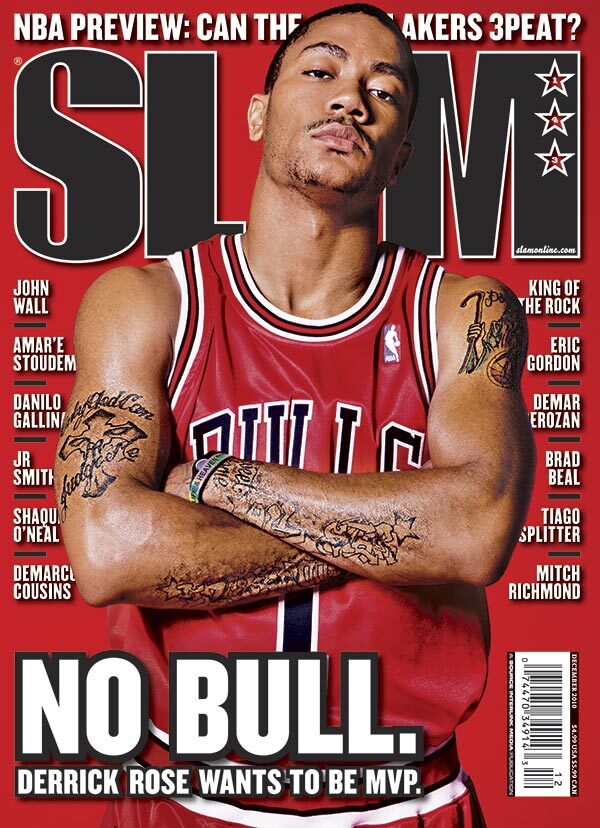For three decades we’ve covered many amazing basketball characters, but some stand above the rest—not only because of their on-court skills (though those are always relevant), but because of how they influenced and continue to influence basketball culture, and thus influenced SLAM. Meanwhile, SLAM has also changed those players’ lives in various ways, as we’ve documented their careers with classic covers, legendary photos, amazing stories, compelling videos and more.
We compiled a group of individuals (programming note: 30 entries, not 30 people total) who mean something special to SLAM and to our audience. Read the full list here and order your copy of SLAM 248, where this list was originally published, here.
“Are you serious? Like, for real?”
Derrick Rose can’t believe what he’s hearing. It’s a Thursday morning in Memphis, and even though the Grizzlies don’t have an official practice on the books today, DRose is at the team’s facility to lift weights, run drills and get some shots up—things a guy in his 16th NBA season has learned how to do to keep his game sharp.
That Rose is even in Memphis at all these days is something of a miracle, a testament to how the world is reciprocal and a chance for Rose’s career to wind down in the same arena where he stamped his spot on the national scene. After playing high school ball in Chicago, where he made his name as another in a long line of celebrated ballers from Simeon Academy, Rose left the Windy City in favor of the Bluff City, joining John Calipari at the University of Memphis. After a 26-0 start, the Tigers made it to the NCAA Tournament with a 33-1 record, eventually losing to Kansas in the championship game.
After one year in Memphis, Rose went back home, the first overall pick of the Chicago Bulls. He won a Rookie of the Year award, made an All-Star team and became one of the pillars of adidas basketball. In a League of Goliaths, Rose was David, fearlessly attacking giants and slaying each possession as if it was his last. Rose played with breathtaking abandon, and his furious styles earned him legions of fans.
And then, before just his third NBA season, Rose appeared on the cover of SLAM for a third time and called his shot: He wanted to be the NBA’s MVP. Right away. So, he spoke his truth into existence in the pages of SLAM 143.
“That was really me gauging the talent in the League at the time and feeling like I could compete against that,” Rose says today. “So why not go for it? I wanted to go for it, and I was also thinking about getting a championship, so I said that as a way to hype myself up.”

Whatever the method, it worked. Rose won an MVP at age 22, the youngest player in NBA history to win the nod. And then, not long after, during a first-round playoff game in 2012, Derrick Rose tore his ACL, knocking him out for an entire season. He returned in 2013 and posted four consecutive seasons averaging double-digits, but it was a different Derrick Rose, and not just on the court. Rose used his forced time away from the game to “figure out who I really am as a person…Back in the day, when I first got [to Memphis], I wasn’t able to articulate myself like this. So with me expressing myself like this, someone who has been an introvert, I pat myself on the back, because I had to work to get to where I’m at.”
The changes weren’t only internal. Looking back at some of those old SLAM covers, Derrick Rose is almost unrecognizable today. The eyes are still there—that laser-sharp stare—but the old Rose had short hair and a handful of tattoos. These days, Derrick Rose’s braids brush the tops of his shoulders, tattoos run all the way up to his chin, his neat goatee has blossomed into a full beard. He’s quick with a grin and willing to drop knowledge wherever he can—when the Grizzlies struggled defensively earlier this season, it was Rose who called out their need to improve communication. He may no longer be able to stop on a dime and soar over defenses, but his accumulated institutional knowledge makes him invaluable to NBA teams in need of leadership and experience, like the Grizzlies.
Rose says playing such a pivotal part of SLAM’s history means a lot: “When you think about the AI cover, that was the most iconic one that I can remember—the hair out, everything. For me, it’s an honor to actually be on the cover, and know there are people who still rock that cover, who still have those covers framed.”

And the disbelief? That came from being told that his old covers are among the most popular t-shirts that SLAM has ever produced.
“Are you serious?” Rose repeats. When confirmed, Rose smiles wide.
“That’s love, right there.”
Feature via Getty Image. Portrait by Atiba Jefferson.